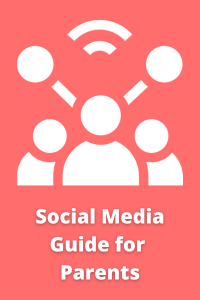Keeping your children safe and smart as they access the world of technology can be a daunting task fraught with anxiety. The following resources will help you protect your children with confidence as they navigate the digital world.
Be sure to scroll down for additional resources.
 Oversharing & Your Digital Footprint (YouTube- Common Sense Education): Teens share the truth about sharing information online and what happens to what you post online.
Oversharing & Your Digital Footprint (YouTube- Common Sense Education): Teens share the truth about sharing information online and what happens to what you post online.
Your Digital Footprint Matters (Internet Society): This quick series of tutorials has everything you need to know about online data tracking, including how to take control.
Help Kids Post, Comment & Upload Responsibly (Common Sense Education): 4 tips to help parents guide their kids safely through social media. Includes downloadable PDF.
 Parent Guides from ConnectSafely (Connect Safely): This collection of parent guides covers everything from Tik Tok, Roblox, Cyberbullying, Amazon Alexa, Media Literacy and more.
Parent Guides from ConnectSafely (Connect Safely): This collection of parent guides covers everything from Tik Tok, Roblox, Cyberbullying, Amazon Alexa, Media Literacy and more.
Be Internet Awesome (Google): Find a collection of information, games and resources to help parents and educators keep kids safe and secure online.
Internet Safety for Kids (SafeWise): Learn about common online threats for kids and how to keep your kids safe.
Your Privacy in a Growing Internet of Me (Stay Safe Online): This infographic shows how your data is collected across different connected devices.
Help Boost Kids’ Safety, Privacy & Security (Common Sense Education): Four tips to help parents protect tweens and teens personal information online. Includes a downloadable PDF.
 Kids & Tech: Tips for Parents in the Digital Age: (American Academy of Pediatrics): Learn how to build a family media use plan to set and enforce healthy digital boundaries.
Kids & Tech: Tips for Parents in the Digital Age: (American Academy of Pediatrics): Learn how to build a family media use plan to set and enforce healthy digital boundaries.
Social Media, Social Life: Teens Reveal Their Experiences (Common Sense Education): Teens share their opinion. Check out the infographic to find out where teens can use some help.
How and When to Limit Kids’ Tech Use (New York Times): There is no one-size-fits all tech plan to build a healthy lifestyle. This guide will help parents guide effective tech use.
Stop Thinking About Screen Time (YouTube- Connect Safely): Learn how “screen time” is less important than what you do online. Start asking how and why your kids spend time online.
 Parent Guides from ConnectSafely (Connect Safely): This collection of parent guides covers everything from Tik Tok, Roblox, Cyberbullying, Amazon Alexa, Media Literacy and more.
Parent Guides from ConnectSafely (Connect Safely): This collection of parent guides covers everything from Tik Tok, Roblox, Cyberbullying, Amazon Alexa, Media Literacy and more.
Social Media Facts & Advice for Parents (Internet Matters): Get familiar with social media safety to keep your kids safe online.
Facebook, Instagram & Social Media Guide (Common Sense Education): Find FAQs, articles, and a forum for parents asking questions about social media and their kids.
Help Kids Post, Comment & Upload Responsibly (Common Sense Education): 4 tips to help parents guide their kids safely through social media. Includes downloadable PDF.
 Parent’s Guide to Cyberbullying (ConnectSafely): Use this guide to keep your kids safe.
Parent’s Guide to Cyberbullying (ConnectSafely): Use this guide to keep your kids safe.
Help Kids Fight Cyberbullying (Common Sense Education): Six tips to help parents deal with the cyberbullying and mean behavior kids can face online.
Keeping Kids Safe in Cyberspace (Center for Parenting Education): A guide to help parents learn and navigate safe use of digital communication for children and teens.
What is Cyberbullying (Stop Bullying): Learn how cyberbullies operate, how to establish online rules, deal with bullies, and prevent your kids from becoming a victim.
 Parent Tips and Tricks for Distance Learning (Common Sense Education): A guide to “help parents keep kids focused, interested and balanced while learning from home”.
Parent Tips and Tricks for Distance Learning (Common Sense Education): A guide to “help parents keep kids focused, interested and balanced while learning from home”.
COVID-19 Resources for Remote Learning (Stanford Grad School of Education): Find parent tips & tools and educator tips & tools to get everyone on the same page.
Education at Home (NebraskAccess): Find librarian-curated websites to learn at home.
22 Remote Learning Tips for Parents (TeachThought): Use these tips to help your kids succeed when learning online, both in and out of the classroom.
 How to Spot Fake News and Teach Kids to Be Media Savvy (Common Sense Education): This article has a checklist to spot fake news and a set of tips to help kids be media savvy.
How to Spot Fake News and Teach Kids to Be Media Savvy (Common Sense Education): This article has a checklist to spot fake news and a set of tips to help kids be media savvy.
News Literacy (Games for Change): Find games, activities and resources for parents, students and teachers about news literacy.
How to Identify Fake News in 10 Steps (ProQuest): A PDF checklist to identify fake news.
How to Choose Your News (YouTube- TEDEd): A short video to learn about news literacy.
Parent & Educator Guide to Media Literacy & Fake News (ConnectSafely): Use this guide to help kids navigate media online to determine real from fake news online.
 Free Educational Apps, Games & Websites (Common Sense Media): This curated collection of digital options will keep your kids entertained for hours.
Free Educational Apps, Games & Websites (Common Sense Media): This curated collection of digital options will keep your kids entertained for hours.
Children & Youth Coding Resources (Nebraska Library Commission): Find age-appropriate coding resources for kids and teens.
Kids Library Resource Page (Nebraska Library Commission): Find activity pages, homework help, and other resources curated by a children’s library.




